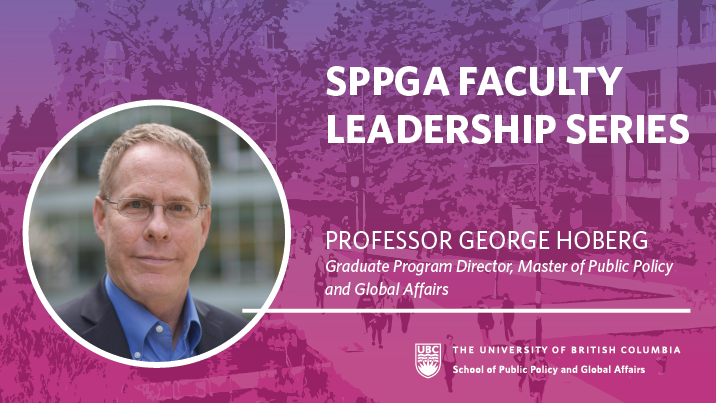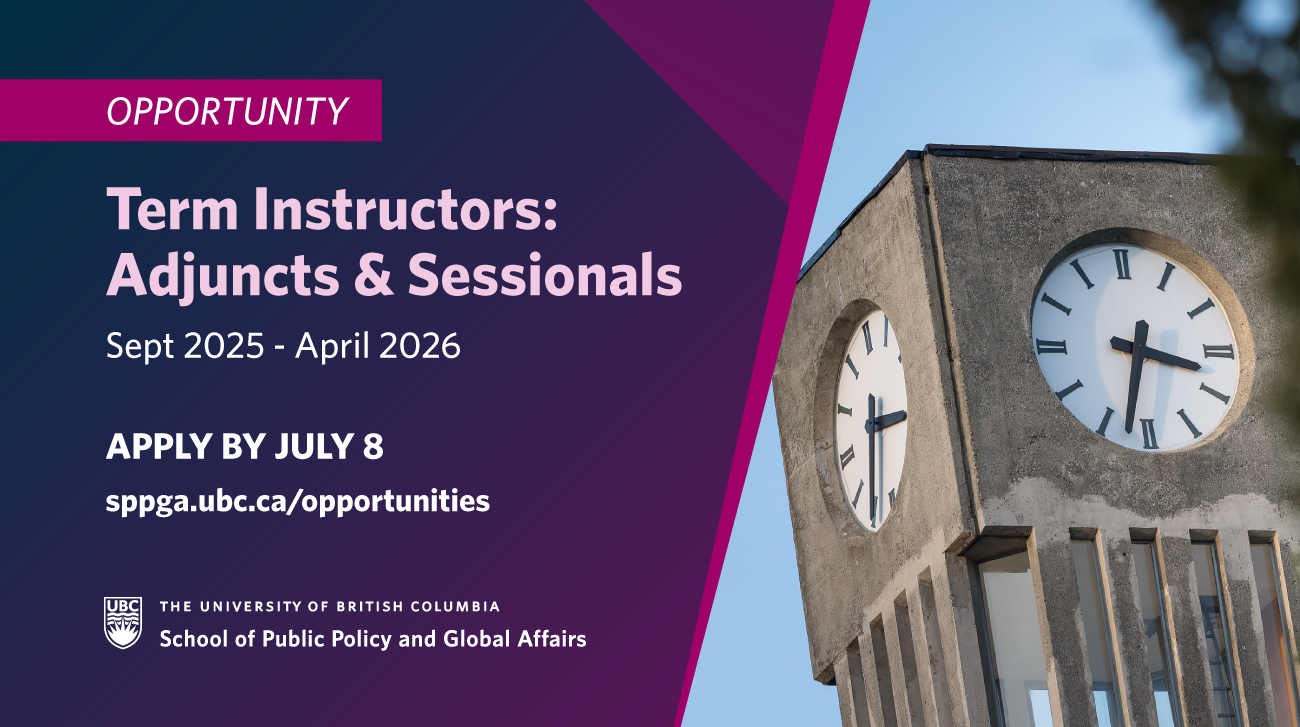

In our SPPGA Faculty Leadership series, meet Dr. George Hoberg, Professor with the School of Public Policy and Global Affairs (SPPGA) and Graduate Program Director of the professional Master of Public Policy and Global Affairs (MPPGA) program at the University of British Columbia.
In an interview with SPPGA, Professor Hoberg shares what drives his research, his goals in the classroom, and how the MPPGA program prepares future policymakers. Learn more about him below.
SPPGA: Could you tell us about your background?
I grew up in a very large family of eight siblings in the eastern United States. When I was 12, my family took a cross-country road trip in a massive motorhome. I got to see the western part of the continent for the first time and that’s when I fell in love with the forests and mountains on the west coast, which also inspired me a deep commitment to protecting the natural environment. So that is how I became interested in the sort of issues that I later studied.
When I was 13, we moved to California, so I went to high school and university there and then went back east for graduate school. My undergraduate degree is in Political Economy of Natural Resources from the University of California Berkeley and my PhD is in Political Science from MIT.
I came to UBC in 1987 to take my first academic job and never left.
SPPGA: Your expertise lies in environmental and natural resource policy and governance with a more recent focus on the clean energy transformation. What drives your research? What local and global issues keep you up at night and why?
What attracted my attention in terms of my research is environmental controversy. That particular focus has shifted throughout my career but it began by looking at air pollution, water pollution, and toxic substances regulation. Then, for a decade or more, I shifted to look at forest conservation controversies, which are a big deal here in British Columbia. In the mid-2000s, my focus shifted to climate issues.
The climate crisis has been something that I’ve been preoccupied with for well over a decade and we’re not making adequate progress on that front. It’s quite remarkable how tangible the impacts have been here in British Columbia over the past six months, where we had a heat dome killing hundreds of people and more recently, a series of storms that have essentially broken our infrastructure. It feels like lately, we’ve been on the cutting edge of climate change impacts and that’s very disconcerting; for me, it motivates me to get back more into political activism on the issues.
SPPGA: You have a new book out, The Resistance Dilemma Place-Based Movements and the Climate Crisis. What did you learn from writing this book? What do you hope readers take away from it?
I was reminded that it takes a really long time to write a book, but it was a labour of love. I became very interested in political conflicts over oil sands pipelines in Canada because it brought together my interests in environmental controversies, social movements, climate policy, and Indigenous rights.
But I’ve also paid increasing attention – this is what the last third of the book is about – to resistance campaigns against clean energy projects. One of the main themes of the book is that in addition to a climate crisis, we have a process crisis but we’re just not very good at getting public support for building infrastructure, whether it’s clean or dirty.
If we want to transition quickly away from a fossil fuel dependent energy system, we have to build a lot of infrastructure very quickly, and we need to get much better at planning for that and getting social buy-in.
SPPGA: How important is social buy-in and how do we acquire it?
What the literature tells us is that if you want to get communities to buy into significant infrastructure change, you have to involve them from the beginning, and you have to make sure that they benefit. This usually involves a much deeper form of engagement than governments are normally comfortable doing, but we have a significant track record now showing that if you don’t do that, the delays end up being costlier than that upfront process itself. It’s a form of investment in future legitimacy.
SPPGA: Are you working on any other publications? If so, on which topic area(s)?
I’m ramping up to a new project where I’m hoping to look at a couple of different things. I’m going to extend the examination of clean energy controversies by looking at high voltage transmission lines in Europe, especially in Germany. These high voltage transmission lines are like pipelines for electrons and they tend to create some of the same controversies as oil and gas pipelines because they’re long, linear infrastructures that separate the people who benefit from the energy project from the people who experience the risks in building them. They have caused some tension as some European countries have sought to aggressively decarbonize their energy systems.
I’m also very interested in getting back into looking at old growth forest protection policies. I’ve done a lot of work on that historically, and among the things that I’ve noticed in the recent controversies around Fairy Creek here in British Columbia is that there are no academic commenters on the issue. I might dive back into that and update the history of B.C.’s mostly failed efforts to protect old growth forests.
SPPGA: You are the Graduate Program Director of the Master of Public Policy and Global Affairs (MPPGA) program at UBC. What does this role entail?
The MPPGA Graduate Program Director is really the professor who is the academic leader and has overall responsibility for the administration of the program. The exciting thing about the job is not only getting to teach so many diverse bright young people, but also getting to know the students very well. It is really wonderful to go spend so much time with so many amazing students; of course, my colleagues are wonderful to work with as well.
SPPGA: Applications are open to our professional Master of Public Policy and Global Affairs (MPPGA) program. What should prospective students know about the MPPGA at UBC? How do we train future policymakers and global change makers to address the issues that they care about?
I think one of the most important distinguishing features of our program is the way it connects local issues to global issues. This is one of the reasons why, in my course, I spend a lot of time talking about climate policy and refugee policy, because they both connect United Nations agencies to municipal governments and, through them, several other levels of government as well. I think that’s a very important series of connections to make.
A second distinguishing feature is our emphasis on applied learning in the Global Policy Project. MPPGA students in their second year take a capstone course where they work directly with real world clients on a significant policy challenge. Many of our students find that the most rewarding part of the program.
SPPGA: What do you teach in the Master of Public Policy and Global Affairs program? What have been some a-ha moments in the classroom for either your students or yourself?
I’ve been teaching two courses lately. Since I’ve been Graduate Program Director, I’ve taught the core course on domestic and global policy processes and I teach a second year course on energy policy, both of which are real labours of love for me. In the past, I’ve also taught part of the Global Policy Project.
One of the things I love about both of those courses is that I let students pick their own jurisdiction and topic to work on and, as a result of that, we end up getting papers delivered and presentations made from people all around the world about their own countries: Nigeria, Afghanistan, Brazil, United States, Germany, Norway.
One of the “aha” moments is this: I spend a lot of time in both classes and an undergraduate class that I’ve taught in the past teaching about climate change. A lot of my career has been focused on trying to get students to take climate change more seriously than I thought they were. A couple of years ago, in the middle of that effort, I realized that some students in the class were crying. I realized I needed to shift the focus to helping people think through not only the political, policy, ecological, and economic consequences of climate change, but also the emotional ones. And to shift to the importance for all of us to find a way to build our own personal resilience in addition to helping our societies become more resilient to climate change.
Thank you Professor Hoberg.


